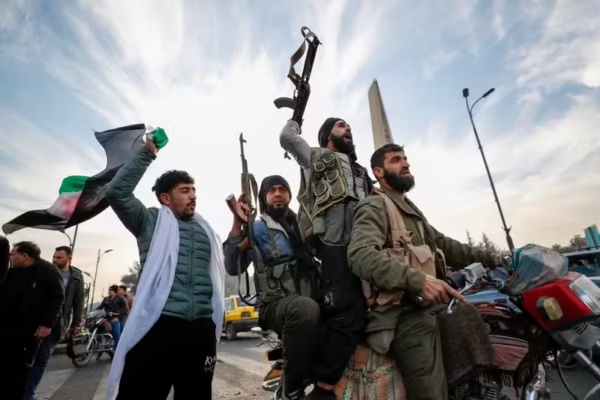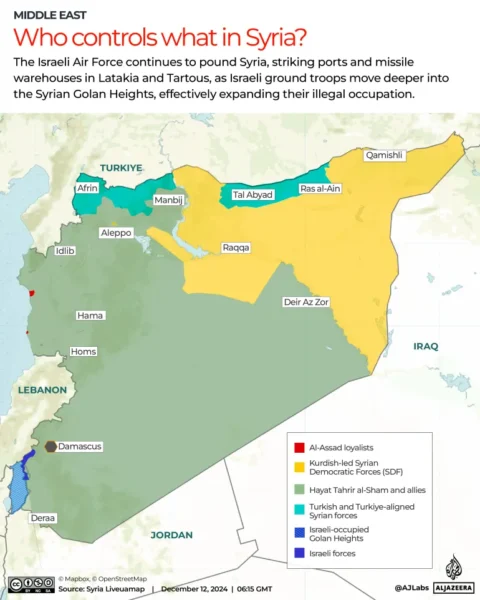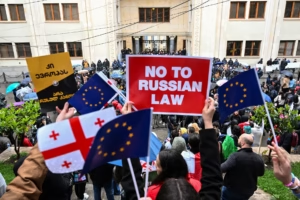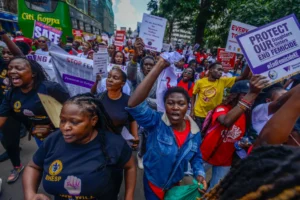For over fifty years, the Assad regime has held Syria firmly under its control. The latest in line, Bashar Al-Assad took over in 2000 after his father Hafez passed away. In 2011, he suppressed a pro-democratic revolt, plunging the country into a civil war that lasted over a decade, taking over half a million lives and displacing 12 million people. On November 27th, rebels set out on a new offensive, this time around led by the militant group Hayat Tahrir al-Sham (HTS) with Mohammed Al-Jolani at its forefront. It accused the government of increasing attacks on civilians and justified the offense by saying it was meant to “deter aggression”.
Rebels on the Rise: The Fall of Key Syrian Cities
The ruling regime held most of the territory with help from Russia, Iran, and Iran-backed militias like Hezbollah. However, some parts of the country were out of their control and that is where the rebels gathered their numbers and launched the offensive. They began their offensive in the northwest of the country, taking Aleppo, Syria’s second-largest city after just three days. HTS claimed to have faced little resistance. At the same time, the Turkish-backed rebels launched an offensive north of Aleppo against a Kurdish-led militia alliance called the Syrian Democratic Forces (SDF). Assad reacted by promising retaliation, vowing to “crush” the rebellion. Russia increased the intensity of airplane attacks on rebel positions, and Iran-backed militias sent reinforcements to help Assad near Hama – the city on the way toward Damascus. That was not enough as Hama fell after several days of fighting.
The rebels’ next objective was to capture Homs, Syria’s third-largest city, and it only took them one day. Simultaneously, other fractions of their forces reached the outskirts of the capital. Commanders in the Operations Room, an online channel the opposition forces used to organize their fractions during the offensive claimed that they received 5000 calls in one day from soldiers wishing to surrender, listing their families as the main motivation. With no response from Assad to the rebels’ encroachment, the soldiers loyal to the government were left without a leader and left their posts one by one. The following day, Damascus fell, and HTS declared victory, claiming that “the tyrant Bashar Al-Assad has fled”. Russian officials confirmed that Assad and his family were granted asylum in Moscow.

Rebels and civilians celebrating the victory, courtesy of Le Monde.
Upon taking control of the capital, HTS released detainees from Saydnaya, the country’s infamous prison for torture. Tens of thousands of people were let out, and people stormed Saydnaya in an effort to find their missing relatives. After searching for hidden rooms and passages, it was concluded that the fate of over 100,000 missing people was sealed.
The HTS promised to build a “homeland for all, including all sects and social classes.” Assad’s fall was announced on state television, as the flag of the opposition was hung up to replace the former. The citizens went out into the streets to celebrate, with the rebel soldiers firing at the sky to signal their victory. The residents asked to be taken to the “house of the donkey”, the presidential palace that had cost $1bn of tax money to build. People rejoiced in a newly found freedom and spoke out loud about the future of their country for the first time. Turkey claimed that 7,600 Syrians crossed the border to return home following the fall of Assad.
Global Reactions and Domestic Challenges: Navigating Syria’s Uncertain Future
Leaders across the international community expressed varying viewpoints regarding the unfolding events in Syria. Russian Spokesman Dimitry Peskov said Russia was as “surprised” as everyone else following the events and that Syria was “going through a very difficult period now, due to instability.” Turkey had the opposite sentiment, expressing satisfaction regarding Syria’s future, saying it was now in its own hands. Joe Biden called the downfall of the ruling regime a “fundamental act of justice” but warned against the risk and uncertainty brought by the installation of the Islamist rebels. Israel’s Prime Minister Benjamin Netanyahu took credit, claiming it was the “direct result” of Israel’s retaliation against Iran and Hezbollah.
The new prime minister, Mohamed Al-Bashir, has stated that an interim government will rule until March, but the outcome after that remains uncertain. There are some concerns that authoritarianism could remain the ideology lingering around Damascus, despite the change in government considering the background of the victors. The HTS is still classified as a terrorist organization according to the US, Turkey, the UN, and several other Western nations; and Al-Jolani may find it difficult to enjoy his victory with a $10 million bounty hanging over his head. However, Al-Bashir has made optimistic promises, pledging to fight corruption, restore order, and protect the entirety of Syria’s ethnic diversity, despite the Islamic roots of HTS. The rebels ordered the national oil company to resume operations within 24 hours of the takeover and electricity was directed even toward the coastal areas not yet taken over by their forces.

Power distribution across Syria, courtesy of Al Jazeera.
The rebuilding of Syria’s economy remains the greatest challenge posed to the new government. Around 90% of the citizens live under the poverty line and most households receive under six hours of electricity per day. This might still be a prevalent issue as over 80% of the country’s oil products were imported from Iran, which backed Assad’s regime. There remains enough to last a month, but it is unclear where supplies will be drawn from after that. National factories were also destroyed, and workers were sent to war during the Civil War period, and this will take time to rectify. Finally, the new government will need to repay a mountain of debt, including some to Russia.
Hayat Tahrir Al-Sham’s victory is historic and revolutionary. Syria finds itself under new rule after over half a century, with that in a whirlpool of uncertainty and excitement. Time will tell how things will unfold, but the citizens of Damascus find themselves in a situation where they can hope for a brighter future.
Featured image: HTS fighters with their flag in full display, source: NBC News.







